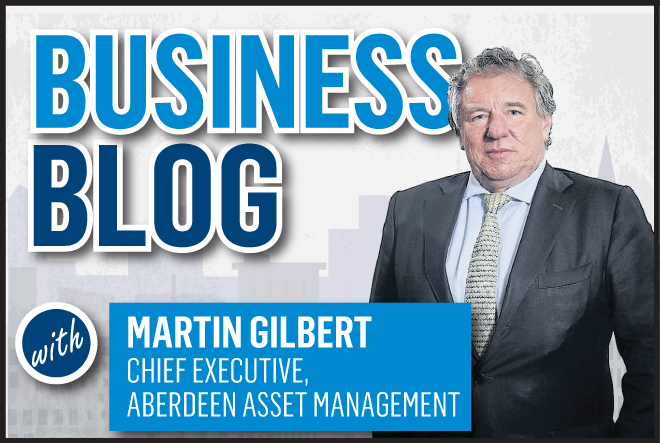A year ago this month I had the satisfaction of signing the Time to Change Employer Pledge on behalf of Aberdeen Asset Management, signalling our determination to tackle the stigma and discrimination associated with mental health issues, focusing on the workplace.
Since the Employer Pledge involves a commitment to develop an action plan to counter mental health discrimination, we immediately created a Mental Health Employee Working Group. The good attendance at its opening meeting showed colleagues were keen to engage with this initiative and promote mental wellbeing.
The group have run successful and thought provoking initiatives over the last 12 months, culminating in our Wellbeing Week, held earlier this month. Colleagues across the UK explored the theme of Wellbeing through taster sessions, talks and activities, coinciding with Mental Health Awareness Week. Our Wellbeing Week focused on five key areas: exercise and fitness, taking on new challenges, diet and nutrition, relaxation and positive mental health, and connecting with others.
That’s a pretty diverse range, but all those topics are crucially related to wellbeing and mental health. One in four British workers is experiencing mental health problems at some level. Many will require professional assistance, but the first line of defence against stress and the mental problems it creates should be an inclusive climate in the workplace.
If problems arise, instead of trying to conceal them, a distressed employee’s first resort should be to speak to someone, whether a family member, friend, or work colleague. There should be access to support and guidance for line managers and employees, with senior executives accessible and listening. I’ve often said there are times when the offer of a chat over a coffee can make all the difference to someone that may be having a tough time.
It’s not a sign of weakness but of responsibility and maturity to speak up about problems to colleagues and managers. The worst harm is done not by the initial problem but by the perceived stigma associated with acknowledging it. We need a massive culture change to tackle mental illness in the workplace, to promote universal recognition that a mental health problem should be no less discussed than breaking a leg on a ski slope.
I’m glad to say that culture change is taking place. In the past year it has noticeably accelerated. Last January the UK government stepped up its commitment to promoting and restoring mental health. Since Aberdeen Asset is also a signatory to the Equality for Mental Health statement, demanding increased funding in the NHS for mental health, I hope policymakers will now walk the walk.
But in terms of the rhetoric surrounding mental health the most influential boost came last month from Princes William and Harry, joint coordinators of the Heads Together campaign to remove the stigma from mental health issues, speaking out very frankly about the trauma in their own lives, with Prince William saying we must end the culture of “keep quiet and carry on” in response to mental illness.
Both these young men have served in the armed forces, played demanding sports and tested themselves, physically and psychologically, to the limit. If they have no problem in talking about personal traumas, nobody else should feel ashamed to do the same.
The media are beginning to “get it” too. The recent BBC documentary “Mind Over Marathon” charted the progress of a number of individuals with mental health issues who took on the challenge of running the London Marathon, showing them as active and competitive. It also highlighted the contribution physical exercise can make to improving mental health.
Another indication of an improving climate is the fact 483 organisations have now signed the Time to Change Employer Pledge. They represent a broad spectrum of activity, from universities to Tesco, from ITN to the Intellectual Property Office. The mental health charity Mind has produced comprehensive advice for promoting mental health at work, including simple things like looking out for colleagues and ring-fencing the lunch break. My own contribution would be to advocate having everyone, including the CEO, work in an open plan office to aid an inclusive and supportive place of work.
For obvious reasons, the financial services industry is a high-risk profession as regards mental health. Clinics in the City have identified specific mental illnesses to which financial practitioners are especially vulnerable, with depression heading the list. The suicide a year ago of Martin Senn, former CEO of Zurich Insurance, was a wake-up call to the industry because of the high profile of the victim, but he was not the first to succumb to the stress of massive responsibilities to stakeholders.
We must take every preventive measure to end such tragedies. Stress and anxiety – even fear – have no place in a properly performing business. Employees will only deliver to their maximum potential in a positive, collaborative, team environment. Employers should always remember that their greatest asset is their people.
